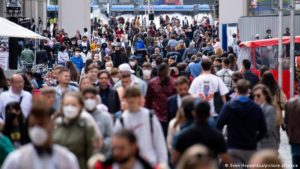
New rules are coming into force as Germany continues its battle against the coronavirus. Two groups of people are getting particular attention.Three million people over the age of 60 remain unvaccinated. Pressure is mounting to change that, short of implementing an actual vaccine requirement. Much of public life in Germany now requires proof of test, vaccination or recovery from COVID-19. In some places, only the latter two will do. As of Monday, the cost of rapid antigen tests is no longer covered by the state.
That means unvaccinated people may be out €10-to-25 ($11-$29) every time they want to enter a restaurant or get a haircut, for example. Starting on November 1, unvaccinated people will not receive compensation for lost pay if coronavirus measures force them to quarantine. The loss of earnings for all citizens who have to quarantine and cannot work because of a suspected or actual coronavirus infection has, until now, been covered by the state. Health Minister Jens Spahn has defended the new move.
“Why should others pay for the fact that someone has decided not to be vaccinated?” he said. He did stress, however, that it is still the right of every citizen to choose not to get vaccinated. His center-right Christian Democrat party (CDU) has staunchly opposed compulsory vaccinations across the board. “It is not about pressure, it is about fairness,” said Spahn.
“It makes a lot of epidemiological sense” to focus on getting the unvaccinated to change their tune, Berit Lange, an epidemiologist at the Helmholtz Center for Infection Research, told DW. “We’ll have to see if it works.” Targeted efforts are key, she added, to find out why people still have not gotten their shot and what can be done to encourage them. “It’s very difficult to say where exactly we are in this pandemic. Globally, we can assume it will go on another two to four years,” said Lange.
“What we do know is that there is not enough immunity in Germany to avoid serious outbreaks that burden hospitals.” At least 68% of people in Germany have received at least one shot, according to the Health Ministry, and at least 85% of those over 60 are fully vaccinated. The figures could be higher, based on a recent analysis by the Robert Koch Institute for public health (RKI). The uncertainty is due, among other things, to some doctors not registering all vaccinations. Has Germany avoided a fourth wave?
To many Germans, it may feel like the country is through the worst of the pandemic. Just 42% of those polled in a recent survey said they worry about rising infections. In the summer, that figure was at 62%. Based on recent statistics, it appears Germany has been able to avoid a fourth dramatic wave of the pandemic.
The seven-day incidence rate has kept steady for the last several weeks at around 60 people per 100,000, although that is higher than at the same point last year. That is only part of the picture. Since late summer, Germany has judged the situation also based on the hospitalization rate, which better reflects serious cases and the burden on the health care system. At 1.6 per 100,000 people, COVID-19 hospitalizations are in the green, and the number of those patients occupying intensive care beds is also low. There are greater concerns at the regional level, such as the four dozen cities or municipalities with incidence rates of at least 100, and in some cases 200. In the western state of North Rhine-Westphalia (NRW), Germany’s most populous state, 280 COVID-19 patients are in the hospital, with half of them on ventilators.
Most of the seriously ill are unvaccinated people. Policies remain cautiously optimistic Germany is moving into winter, with social life moving inside. That increases the risk of spreading infection, as happened last year, and Spahn has warned the vaccination rate is not high enough to guarantee it won’t happen again. “We best not go too quickly, but step-by-step.
So we don’t have to take a step backward,” he said. Unlike in the United Kingdom, epidemiologists like Lange have said people in Germany shouldn’t expect a “Freedom Day,” when all restrictions are lifted, anytime soon. “Whether you can declare one is a political question. Whether you can stick to it is an epidemiological one,” she said.
Rules are necessary to implement, she added, if infections rise and burden the system. Children remain unvaccinated With so many adults vaccinated, attention has turned to those still without a shot and those too young to get one. There are about 9 million children under the age of 12 in Germany who cannot get vaccinated. Infections are high in this group, but health officials say there are few serious cases.
Rules vary based on state, where education policy is decided, and from school to school. One of the biggest points of contention is face masks. The RKI wants kids to be wearing them in class, though many pediatricians disagree with that recommendation. This article was translated from German While you’re here: Every Tuesday, DW editors round up what is happening in German politics and society, with an eye toward understanding this year’s elections and beyond. You can sign up here for the weekly email newsletter Berlin Briefing, to stay on top of developments as Germany enters the post-Merkel era.




 Driving Naari Programme launched in Chandigarh
Driving Naari Programme launched in Chandigarh






























